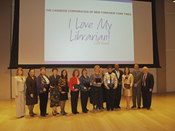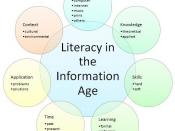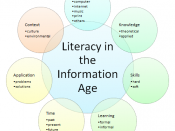Information Literacy
Information Literacy Mission Statement
Your name
Your Instructor's name
Date:
Information Literacy Mission Statement
The aim of providing quality access to world knowledge is the core foundation of the school. Every school has aim to impart knowledge via state to the art teaching methods. It establishes such programs of getting knowledge that are creative in application and according to the main mission of school. In order to prepare students of the school with the perspective of thinking critically there is need of information literacy within that school. They also use important information for their academic, personal, as well as professional lives. In this way student recognizes the importance of information that they can also locate with the use of media and technologies. The students of information literature have compatibility in taking these skills which they acquired from their school education. In this way it can provide benefit in their whole life as professionals or citizens with continues phase of learning.
The media center for propagation of information literary needs to seek such ways that promote it, that usually achieve by learning students of school to understand organization of knowledge. In this respect it should apply the tools that gather data of various levels with using both print as well as information literacy resources. It also makes its effective evaluation regarding the relevancy and authentication of all information in various forms.
It brings them in such a learning environment that provides open and free inquiry, which mostly serves as a catalyst for application, interpretation and integration of all levels of learning. Media center facilities should include following information literacy proficiencies:
Communicate, produce, and create understanding of a topic or subject via synthesis of required information.
Management as well as manipulation with the use of suitable technologies and tools
Recognition of all safety issues that are involved with information technologies and information sharing
Use information and information techniques that are legally and ethically viable.
Continuous learning process that includes research as a multi stage
Use appropriate criteria for the selection and evaluation of data.
Utilizing of all necessary search strategies, and research tools to find out information, that are effective and efficient also.
School and the library are the key factors that are playing effective roles for assisting students to develop their information literacy skills. The success behind the implementation of information literacy depends upon active participation of all parties and it can be attained thorough integration across the curriculum phase of students.
As the information literacy makes it possible to foster students to gain lifelong learning and critical thinking so the role of librarian and libraries is a fundamental principle of higher education. Librarian should be uniquely qualified and he/she equip with all required information literacy skills, techniques and methods.
The librarian should have a leading role in training, developing and delivering all necessary supportive strategies in order to ensure the true meaning of IL. A librarian should possess following competencies for achieving remarkable results:
The librarian needs to demonstrate the value added nature of his/her contributions.
Have a continuous focus throughout his careers.
Have strong communication skills
Have a set of values, attitudes and skills that enable librarians to work effectively and efficiently.
Career development and personal performance
Have extensive knowledge in the areas of research, management, technology, information access and providing information services.
The purpose of establishing information literacy media center builds powerful skills in assisting students of school. It fosters up desired outcomes with developing information seeking abilities that are suitable for students to get them research support. With the effective function of IL media center in the school facilitates the wide resources available to students create a sense of responsibility and independence which encourages a cohesive relationship with instruction or reference faculty. These facilities encourage students to work with library reference instruction faculty in establishing academic related projects which consists of IL objectives. The success of this program provides teaching and learning methodologies that respond to students in learning that have accordance with their culture, style and way of learning.
References
Lenn and Dixie Hannon Library (2012, January 11). Information Literacy and Instruction Mission Statement. Retrieved June 22, 2014, from http://hanlib.sou.edu/instruct/about/mission.html
Keith Curry Lance, Lynda Wellborn, and Christien Hamilton-Pennell, The Impact of School Library Media Centers on Academic Achievement (Castle Rock, Colo.: Hi Willow Research and Publishing, 1993).
Fister, B. (2013). The Library's Role in Learning: Information Literacy Revisited. Library Issues, 33(4). Retrieved from www.libraryissues.com/pub/PDF3304Mar2013.pd


